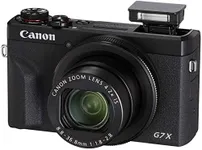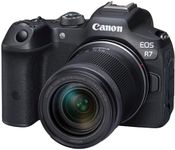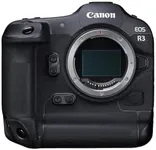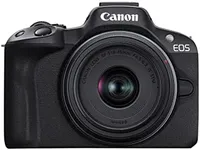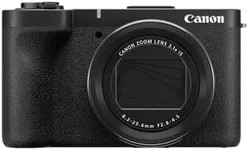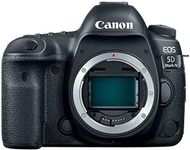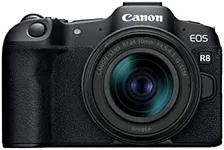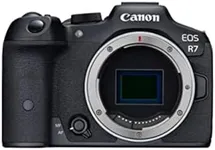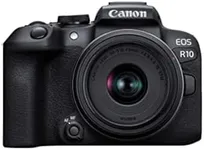Buying Guide for the Best Canon Cameras
Choosing the right Canon camera can feel overwhelming because there are so many models and features to consider. The best approach is to think about what you want to use the camera for—whether it's casual family photos, travel, sports, wildlife, or professional work. Understanding your needs will help you focus on the features that matter most to you. It's also important to consider how comfortable you are with cameras in general, as some models are more beginner-friendly while others offer advanced controls for experienced users.Sensor SizeThe sensor is the part of the camera that captures light and creates the image. Sensor size is important because it affects image quality, low-light performance, and how much of the scene you can capture. The main types are full-frame, APS-C, and smaller sensors. Full-frame sensors are larger and generally provide better image quality and performance in low light, making them great for professionals or serious enthusiasts. APS-C sensors are smaller but still offer excellent quality and are often found in more compact and affordable cameras, suitable for most hobbyists and travelers. If you mostly take photos in good light or want a lightweight camera, a smaller sensor might be enough. Think about what and where you’ll be shooting to decide which sensor size fits your needs.
MegapixelsMegapixels refer to the resolution of the camera, or how many millions of pixels make up each photo. More megapixels mean you can print larger photos or crop images without losing much detail. However, higher megapixels don’t always mean better photos, especially if you don’t plan to print large images. For most people, a camera with 16-24 megapixels is more than enough for everyday use, social media, and standard prints. If you want to make very large prints or crop your photos a lot, you might look for higher megapixel counts.
Autofocus SystemThe autofocus system helps the camera quickly and accurately focus on your subject. This is especially important for action, sports, or wildlife photography where your subject might be moving. Cameras with more autofocus points and advanced tracking features can lock onto subjects faster and keep them in focus. If you mostly shoot still subjects or landscapes, a basic autofocus system will work fine. If you want to capture fast-moving subjects, look for a camera with a more advanced autofocus system.
Continuous Shooting SpeedContinuous shooting speed, often measured in frames per second (fps), tells you how many photos the camera can take in a row when you hold down the shutter button. This is important for capturing action, sports, or wildlife, where you want to catch the perfect moment. Entry-level cameras might offer 3-5 fps, which is enough for casual use. Mid-range and advanced cameras can shoot at 8-20 fps or more, which is better for fast action. Think about whether you need to capture quick bursts of photos or if single shots are enough for your style.
Video CapabilitiesMany Canon cameras can shoot video as well as photos. Video resolution (like Full HD or 4K) and features such as autofocus during video, microphone input, and frame rates are important if you plan to record movies or vlogs. If you only want to take occasional videos, basic video features will be fine. If you’re interested in filmmaking or vlogging, look for higher video resolution, good autofocus in video mode, and audio input options.
Size and WeightThe size and weight of the camera affect how easy it is to carry around. Larger cameras can be more comfortable to hold and may offer more controls, but they can be heavy and bulky. Smaller cameras are easier to carry and travel with, but might have fewer buttons or a smaller grip. If you plan to travel a lot or want a camera for everyday use, a lighter and more compact model might be best. If you don’t mind carrying extra weight for better handling and features, a larger camera could be a good fit.
Lens CompatibilityCanon cameras use different lens mounts, which determine what lenses you can use. Some cameras are compatible with a wide range of lenses, while others are more limited. If you already own Canon lenses, make sure the camera you choose is compatible with them. If you plan to expand your photography with different types of lenses (like wide-angle, telephoto, or macro), check what’s available for the camera you’re considering. Your interest in different photography styles can help guide this choice.
Ease of UseSome Canon cameras are designed for beginners, with simple menus and automatic modes, while others offer more manual controls and customization for advanced users. If you’re new to photography, look for a camera with helpful guides, automatic settings, and a straightforward interface. If you want to learn and grow your skills, or if you already have experience, a camera with more manual controls and customization options might be better.

